Traditional CO₂ Incubators vs. Modern CO₂ Incubators: Which is Right for You?
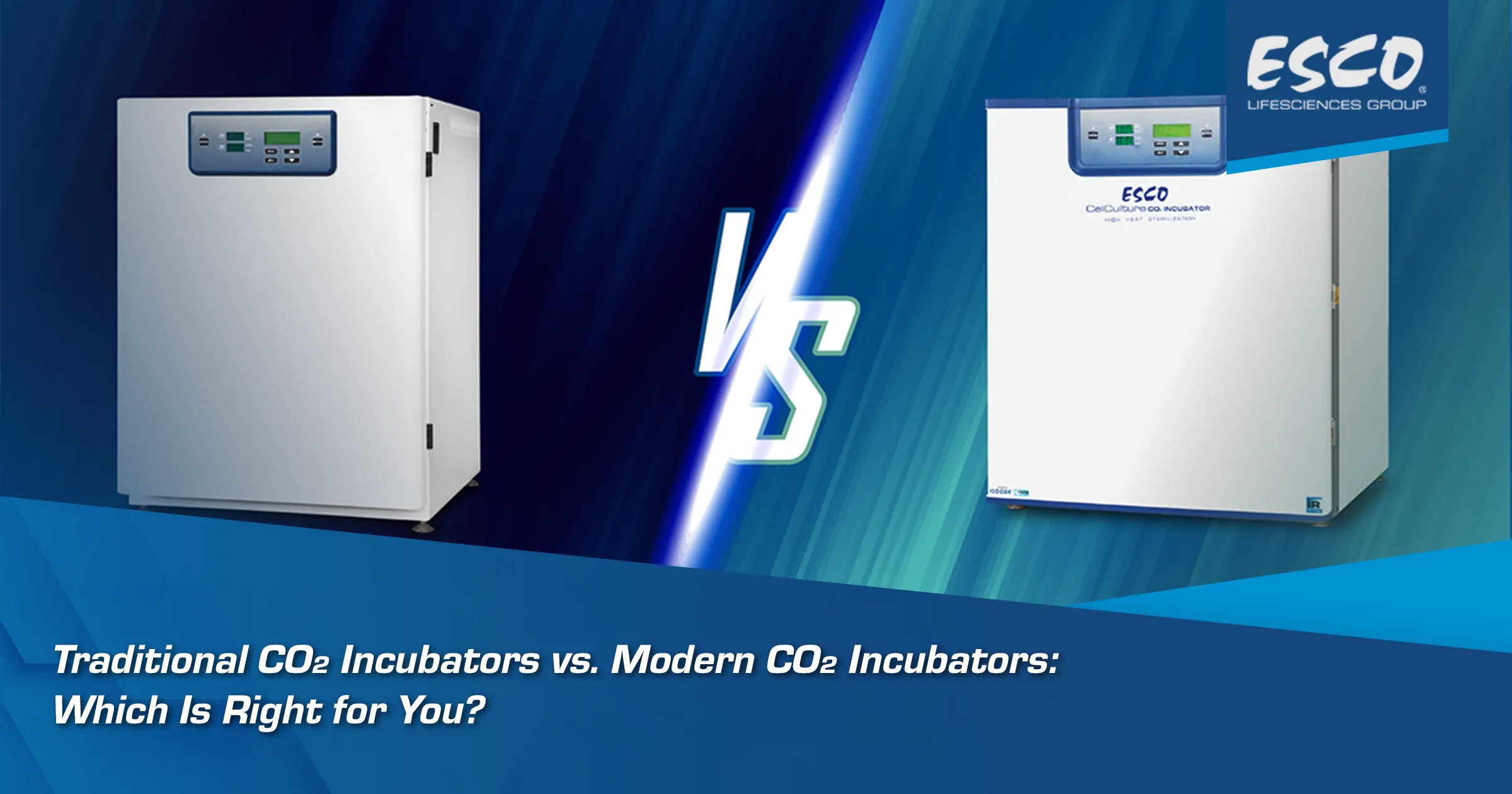
I. Introduction
How important is it to maintain optimal conditions in cell culture applications?
Creating and maintaining optimal conditions, including temperature and environment, is crucial for cell culture preparation. Cells thrive in these conditions because they have access to essential nutrients, a suitable temperature, a balanced pH, and other factors that support cellular growth, metabolism, and function. With these necessities met, cells can effectively perform functions such as nutrient uptake, energy production, and waste removal, ensuring their well-being and promoting growth.
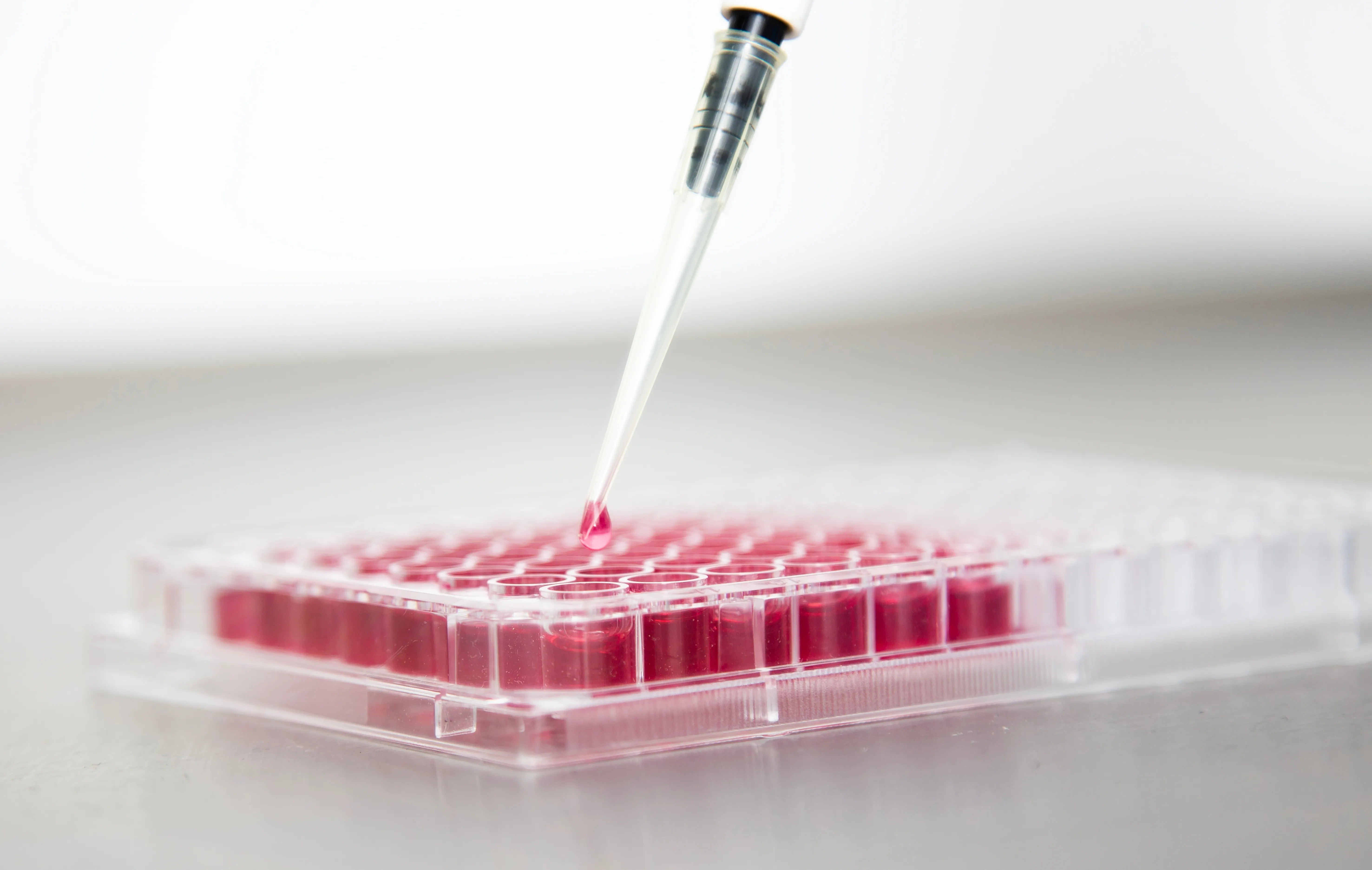
What role do CO₂ incubators play in supporting cell growth and viability?
To recreate the ideal conditions for cell cultures in a laboratory
setting, scientists utilize a specialized piece of equipment known as a CO₂ incubator. This
temperature-controlled incubator has been crucial in maintaining the required temperature ever since its
commercial introduction in the late 1960s.
CO₂ incubators offer a stable environment for cells by regulating the
factors below.

|
Temperature Control: CO₂ incubators are equipped with precise temperature control systems that maintain a constant temperature ideal for cell growth, typically around 37°C for mammalian cells. |

|
Humidity Regulation: These incubators have mechanisms to regulate humidity levels, ensuring that the environment remains adequately moist for cell health and preventing desiccation. |

|
CO₂ Control: CO₂ levels are crucial for cell culture as they affect pH and cell metabolism. CO₂ incubators can control and maintain specific CO₂ concentrations, often around 5%, to create an optimal physiological environment for cells. |

|
Sterile Conditions: CO₂ incubators are designed with features such as HEPA filters and antimicrobial surfaces to maintain sterility and prevent contamination, essential for cell culture experiments. |

|
Uniformity: Uniformity: Modern CO₂ incubators are designed for uniform temperature, humidity, and CO₂ distribution throughout the chamber, ensuring consistent growth conditions for all cells within the incubator. |
By integrating these features, CO₂ incubators provide a controlled and stable environment that mimics the conditions necessary for cells to grow and thrive, making them indispensable tools in cell culture laboratories.
II. How do Traditional CO₂ incubators differ from Modern CO₂ incubators?
A. Traditional CO₂ Incubators
Traditional CO₂ incubators are older models of CO₂ incubators that offer fewer features and capabilities compared to modern versions. These incubators typically provide basic functionalities such as temperature control, CO₂ regulation, and humidity management but may lack advanced features found in newer models. While modern CO₂ incubators offer advanced features and capabilities, traditional models still hold value in many laboratory settings due to their reliability, cost-effectiveness, and ease of use.
Advantages of traditional CO₂ incubators include:
- Reliability: Traditional CO₂ incubators are tried-and-tested equipment with a long history of successful use in cell culture applications, offering proven reliability.
- Cost-Effectiveness: Compared to modern CO₂ incubators, traditional models often have a lower initial cost, making them more budget-friendly for laboratories with limited resources.
- Ease of Use: Traditional CO₂ incubators typically have straightforward controls and operation, requiring minimal training for users to operate effectively.
- Suitability for Basic Research: For basic cell culture experiments that do not require advanced features, traditional CO₂ incubators can provide sufficient functionality at a lower cost.
- Compatibility: Traditional CO₂ incubators are compatible with a wide range of cell culture protocols and experimental setups, making them versatile tools for various research applications.
Disadvantages of traditional CO₂ incubators
- Limited control over environmental parameters such as temperature, humidity, and CO₂ levels.
- Potential for temperature fluctuations, affecting cell growth and viability.
- Less advanced features compared to modern incubators, limiting experimental capabilities.
- Higher risk of contamination due to less robust sterilization methods.
- Limited scalability for accommodating diverse research needs and experimental setups.
While traditional CO₂ incubators are still effective for basic cell culture applications, they may not offer the same level of precision, convenience, or versatility as their modern counterparts. Researchers often opt for modern CO₂ incubators due to their enhanced technology, improved performance, and additional features that cater to specific research needs.
B. Modern CO₂ Incubators
Modern CO₂ incubators offer a range of advanced features and capabilities that surpass those of traditional CO₂ incubators. These newer models incorporate state-of-the-art technology and innovative designs to provide superior performance, precision, and versatility in cell culture applications.
Key features of modern CO₂ incubators include:
- Advanced Temperature Control: Modern CO₂ incubators have precise temperature control systems with digital displays, setpoint adjustments, and rapid temperature recovery after door openings.
- Enhanced CO₂ Regulation: They offer precise control over CO₂ levels, often with the ability to adjust CO₂ concentrations within a wide range to accommodate different cell types and experimental requirements.
- Humidity Management: Many modern CO₂ incubators include advanced humidity management systems to maintain optimal moisture levels for cell growth and viability.
- Uniformity: Modern CO₂ incubators are designed for uniform distribution of temperature, CO₂, and humidity throughout the chamber, providing consistent growth conditions for all cells.
- Enhanced Safety Features: They may include alarms for temperature fluctuations, CO₂ level deviations, and power failures, as well as backup systems to protect cell cultures during emergencies.
- User-Friendly Interface: Many modern CO₂ incubators have intuitive touchscreen interfaces, data logging capabilities, and remote monitoring options for easy operation and monitoring of experiments.
Limitations of modern CO₂ incubators may include:
- Higher initial investment costs compared to traditional models.
- Complex operating systems that may require specialized training for users.
- Ongoing maintenance costs for advanced features and technology.
- Limited compatibility with certain experimental protocols or equipment.
- Potential for technical issues or downtime due to sophisticated systems.
- Dependence on electricity or power sources for operation, which can be a concern during outages.
- Higher risk of user error or misconfiguration due to the complexity of features.
Besides the benefits offered by modern CO₂ incubators, they may also have drawbacks. However, many researchers believe that the benefits and improved performance of modern CO₂ incubators outweigh these disadvantages, particularly for demanding research applications where precise control, reliability, and advanced features are crucial.
C. Summary of the Advantages and Disadvantages of Traditional and Modern CO₂ Incubators
Traditional CO₂ Incubators |
|
| Advantages | Disadvantages |
|
|
Modern CO₂ Incubators |
|
| Advantages | Disadvantages |
|
|
III. What are the key considerations in choosing between modern and traditional CO₂ incubators?
Choosing between modern and traditional CO₂ incubators is a crucial decision in laboratory settings. Here are some factors to consider when making this choice:
- Features and Capabilities: Evaluate the specific features and capabilities offered by each type of incubator. Modern CO₂ incubators typically offer advanced technology, precise control, and additional functionalities compared to traditional models.
- Experimental Needs: Consider the specific research requirements and experimental protocols. Determine if the advanced features of modern CO₂ incubators are necessary for the experiments or if a traditional model would suffice.
- Humidity Management: Many modern CO₂ incubators include advanced humidity management systems to maintain optimal moisture levels for cell growth and viability.
- Budget: Assess the budgetary constraints and compare the cost of modern and traditional CO₂ incubators. Keep in mind the initial investment, ongoing maintenance costs, and any additional expenses such as training or accessories.
- Space and Capacity: Consider the physical space available in the laboratory and the capacity needed for the cell culture experiments. Modern CO₂ incubators may have larger capacities or additional features that require more space.
- Ease of Use: Evaluate the user-friendliness and ease of operation of both types of incubators. Modern CO₂ incubators may have intuitive interfaces, remote monitoring capabilities, and data logging features that enhance usability.
- Long-Term Reliability: Consider the long-term reliability and durability of the incubator model. Modern CO₂ incubators often come with warranties and service agreements that provide peace of mind and support for ongoing maintenance.
- Compatibility: Ensure that the chosen CO₂ incubator is compatible with the existing laboratory equipment, such as microscope stages, shakers, or monitoring systems.
IV. Conclusion
Why is it crucial to match incubator choice with specific research needs?
Learning which CO₂ incubator is suitable for your needs is crucial because selecting the right one according to specific research requirements improves performance, promotes reproducibility, reduces costs, optimizes resource utilization, increases data accuracy, and supports long-term success in scientific research.
Benefits of Choosing the Right Incubator

|
Optimal Performance: Using an incubator tailored to the research requirements ensures optimal performance and reliable experimental outcomes. |

|
Experimental Reproducibility: The right incubator can help maintain consistent environmental conditions, enhancing the reproducibility of experiments and results. |

|
Cost Efficiency: Selecting an incubator that meets the needs without unnecessary features can save costs on initial investment and ongoing maintenance. |

|
Resource Utilization: A well-suited incubator maximizes resource utilization by providing the necessary functionalities without excess or insufficient capabilities. |

|
Data Accuracy: The right incubator contributes to data accuracy by creating an environment conducive to cell growth and viability, minimizing experimental errors. |

|
Long-Term Success: Choosing the right incubator promotes long-term success in research endeavors by providing a reliable platform for cell culture and experimentation. |

|
Optimal Performance: Using an incubator tailored to the research requirements ensures optimal performance and reliable experimental outcomes. |
Outlook and potential advancements in CO₂ incubator technology
The ongoing advancements in CO₂ incubator technology hold immense
promise for the scientific community. These advancements will not only improve data accuracy and experimental
reproducibility but also enhance workflow efficiency and flexibility. By offering customizable environmental
conditions, multi-chamber systems, seamless integration with other equipment, and energy-efficient designs,
future CO₂ incubators will revolutionize cell culture research. Moreover, the implementation of advanced
contamination control measures will ensure a clean and sterile environment, reducing contamination risks and
enhancing experimental reliability.
Overall, the outlook for CO₂ incubator advancements is incredibly positive, paving the way for groundbreaking
discoveries and advancements in various scientific fields.
Esco Lifesciences offers an extensive range of CO₂ incubators
fit for different cell culture laboratory requirements. The Esco CO₂ incubators are equipped with
advanced variable controls and ensure even distribution of temperature, CO₂, and humidity throughout the
chamber.
Apart from standard CO₂ incubators, Esco manufactures a variety of models with options such as filter addition,
sterilization cycle, UV lamp installation, chamber material, external construction material, and O2 control.
This allows consumers to tailor their choices based on their specific requirements.
-
Standard Models
CelMate® CO₂ Incubator CelCulture® CO₂ Incubator 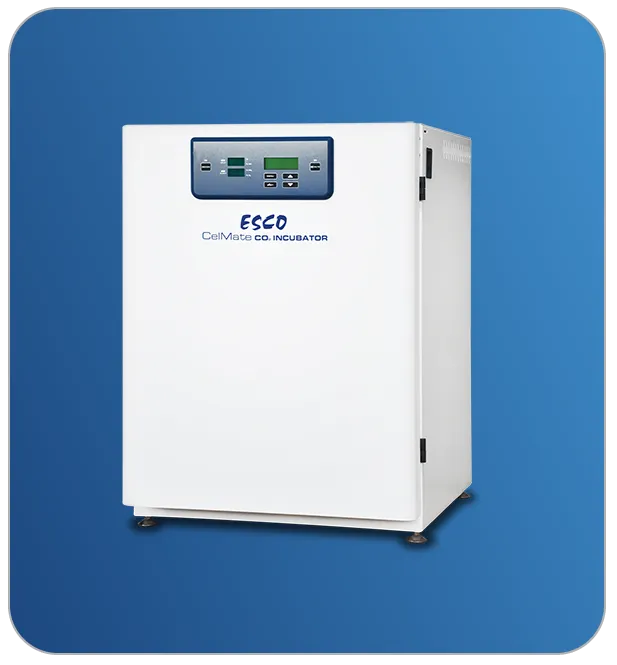

VIEW MODELS VIEW MODELS Request for Quote Request for Quote -
Special Models
CO₂ Incubator with Integrated Cooling System (Peltier) CO₂ Incubator with High Heat Sterilization (HHS) CO₂ Incubator with Stainless Steel Exterior CO₂ Incubator with Copper (Cu) Chamber _Esco CO2 Incubator - Esco Lifescience.webp)
.webp)


VIEW MODELS VIEW MODELS VIEW MODELS VIEW MODELS Request for Quote Request for Quote Request for Quote Request for Quote CO₂ Incubator for In Vitro Fertilization CO₂ Incubator with UV Lamp CO₂ Incubator with High-Temperature (HITEMP) CO₂ Sensor 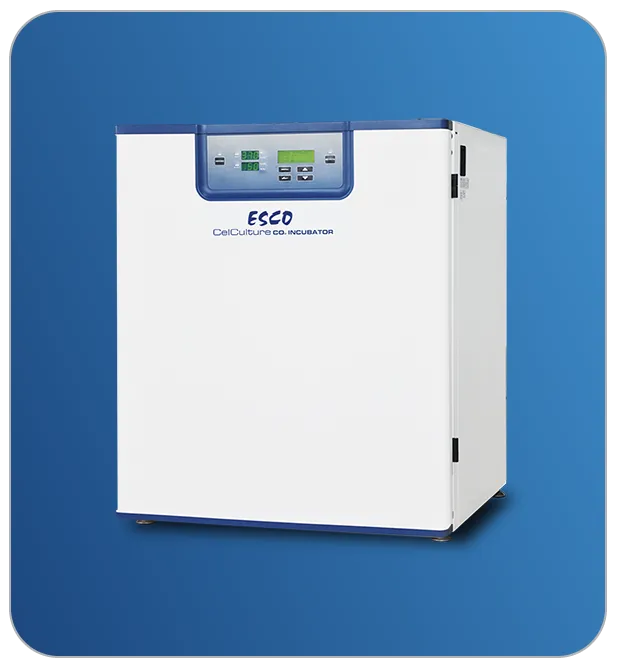
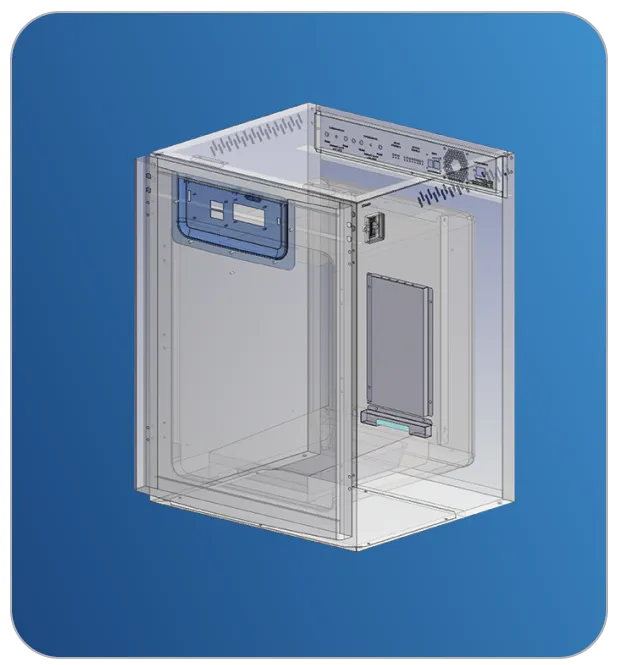
 CO₂ Sensor.webp)
VIEW MODELS VIEW MODELS VIEW MODELS Request for Quote Request for Quote Request for Quote
Read more about Esco CO₂ Incubators: Esco CO₂ Incubator Guide to Models, Must-have Features of a CO₂ Incubator, CO₂ Incubator Proper Maintenance and Installation, CO₂ Incubator Services
Links:
Esco CO₂ Incubator Guide to Models: https://www.escolifesciences.com/resources/choosing-the-right-co2-incubator#panel-2
Must-have Features of a CO₂ Incubator: https://www.escolifesciences.com/resources/choosing-the-right-co2-incubator#panel-3
CO₂ Incubator Proper Maintenance and Installation: https://www.escolifesciences.com/news/proper-installation-and-maintenance-of-co2-incubators
CO₂ Incubator Services: https://www.escolifesciences.com/services/co2-incubator